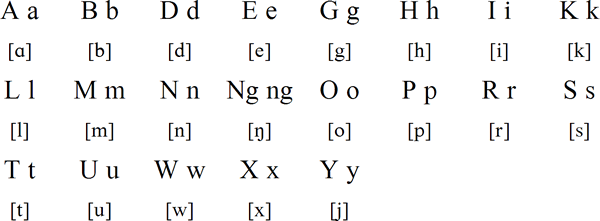Mato is a Western Oceanic language spoken by about 580 people (in 2002) on the north coast of the Huon Peninsula in Morobe Province in Papua New Guinea. Mato has two dialects: Tabares and Remuk, which are spoken in different villages and are mutually intelligible, with only minor variations in pronunciation and vocabulary. The language is also known as Nenaya, Nengaya and Nineia.

Download a alphabet chart for Mato (Excel)
Metil tam gala ha Samasingia. Baing ngala ba ngatui barotia mari, muga bing ngala ngasok xai namuya sai’naga, ngata kenakaiyua mua saing ngaxap waxanga ba ngataxiti waxudi bu ngatui, ngaiti waxanga baing ngabagu moxa tela yanoa duxu ba, ‘Muxum’.
Metil and I went down to Samasingia. So I went and first I cut down (wood for) studs, then I went to the tree trunk. And it is done, I put the axe to it for awhile and I got my knife and cut vines so I could chop (the tree again). I raised the knife and I saw a snake they call “Muxum”.
Details of Mato supplied by Michael Peter Fustümum
Information about Mato
https://en.wikipedia.org/wiki/Mato_language
https://fr.wikipedia.org/wiki/Mato
http://www.ethnologue.com/18/language/met
https://www.sil.org/resources/archives/31282
Adzera, Ahamb, Äiwoo, Aneityum, Apma, Araki, Are, ’Auhelawa, Avava, Babatana, Bariai, Bola, Big Numbas, Buhutu, Bwaidoka, Caac, Cheke Holo, Dorig, Hiri Motu, Hiw, Hoava, Kakabai, Kaninuwa, Kokota, Kove, Kurti, Lakon, Lehali, Lenakel, Lewo, Lote, Lo-Toga, Löyöp, Manam, Marovo, Maskelynes, Mato, Mavea, Mono-Alu, Motu, Mussau-Emira, Mwotlap, Nafsan, Nahavaq, Namakura, Nanggu, Nduke, Neve‘ei, Neverver, Ninde, North Efate, Nume, Paamese, Papapana, Raga, Rotuman, Roviana, Sa, Sakao, Saliba, Siar, Sio, Ske, Sobei, Sursurunga, Tamambo, Tami, Teanu, Tigak, Tirax, Tolai, Touo, Ubir, Ughele, Uneapa, Vatlongos, Vitu, Vurës, Western Fijian, Yabem, Yapese
Languages written with the Latin alphabet
Page last modified: 31.10.22
[top]
You can support this site by Buying Me A Coffee, and if you like what you see on this page, you can use the buttons below to share it with people you know.

If you like this site and find it useful, you can support it by making a donation via PayPal or Patreon, or by contributing in other ways. Omniglot is how I make my living.
Note: all links on this site to Amazon.com, Amazon.co.uk
and Amazon.fr
are affiliate links. This means I earn a commission if you click on any of them and buy something. So by clicking on these links you can help to support this site.
[top]